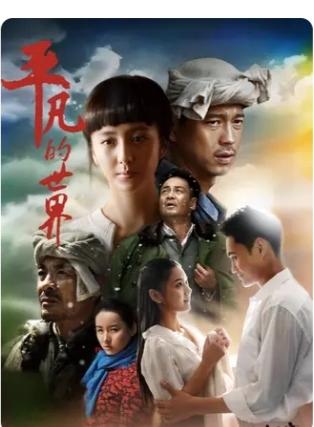Watching the TV series "Ordinary World" has a feeling (modified version)
Text/Great Remorse Remembers Zhi Bing
"Ordinary World" is one of the rare masterpieces that can touch the soul of the Chinese people and not escape reality, and I felt a long-lost spiritual shock when I listened to the song at the end of the TV series. Literature and art should serve people, and in China a hand should be freed up to serve the peasants—they shed blood and sweat for all the people to eat, drink, and make our huge country run day and night.
Like Wang Anyi, Ah Cheng, Deng Xian, Li Xiao, Liang Xiaosheng, and Ye Xin, I am also a 7-year farmer, and I know this best.
"Ordinary World" is a work written by Lu Yao with his life, and he only lived for 42 years!
There is also a writer in Sichuan who writes about farmers, and the writer who writes the novel "Xu Mao and His Daughters", Zhou Keqin, who is also tired of writing, 53 years old, once a farmer, production captain.
Zhou Keqin had better luck than Lu Yao.
"Xu Mao and His Daughters" was written earlier than "Ordinary World", published in 1979, and won the first Mao Dun Literature Award in 1981; "Ordinary World" was published in 1986 and won the third Mao Dun Literature Award in 1991.
"Xu Mao and His Daughters" was released, sensationalizing the whole country, becoming the first Mao Dun Literature Award-winning novel in the first session, and was competed by bayi Film Studio and Beijing Film Studio to make films. The lawsuit reached the Ministry of Culture, and as a result, it was allowed to shoot one film each, and the two films of the same name concentrated on several generations of stars such as Li Wei, Tian Hua, Yang Zaibao, and Liu Xiaoqing.
"In the early morning of August 5, 1990, Zhou Keqin, a famous writer in China who is called a close friend by contemporary farmers, died of overwork and illness at the age of 53, leaving people with many regrets: his novel "Hungry Plains" had not yet had time to revise the first draft, and there were two other conceived novels, as well as many materials, ideas and drafts that had already been written on paper and in books..."
By the way, when Mr. Zhou Keqin was extremely popular and had just been promoted, he actually took time out of his real busy schedule and came to the town with the Leshan poet Zhou Gang to interview my mother, a retired teacher.
After her retirement, my mother cared for unemployed young people, helped teach the runaway youth, ran a cultural tea garden to solve employment problems for several of them who were most difficult; trained the women's dragon lantern team and won the championship in the competition, tutored various units to rehearse programs, held calligraphy and painting exhibitions, set up calligraphy and painting organizations, and enlivened local cultural life; and worked with my father (also a retired teacher) at night school to tutor culture for young workers who were delayed by sports...
My mother made a small town cultural station a provincial advanced.
Before she retired, like my father, she served as a principal in the early days, and teachers of various subjects, including Tuyin and Body, were able to substitute for the class herself. She and my father did their best to open up local education, and in the following decades they were almost always struggling, but after retiring, they made outstanding contributions to society, which shows her selfless kindness and extraordinary talent.
I say this to illustrate that Zhou Keqin's writing is not revolving around personal fame and fortune today, but around the progress of society and the fate of people.
Are there still writers like Zhou Keqin and Lu Yao who write with their lives?
Are there still writers who never write about subjects they are unfamiliar with and that have not touched their hearts?
Yes, they are working hard to create.
For example, Mo Yan, a writer who has won the Nobel Prize and gained fame and fortune, is loyal to literature, tirelessly explores, and categorically abandons the modernist methods that have made him famous and tries postmodern writing.
But there are also people who live on Mars.
They like TV dramas that are far away from life, like children's homes, and they like TV dramas where actors take tones and plots make up nonsense — this is every day.
According to the opinion of Fang Xingdong, the blog's Chinese boss, the actors who play Sun Shaoan and He Xiulian should score full marks. I also think they can perform the taste of the peasants of that era, not easy, not simple. The singer of the ending song of the record was really well chosen, singing naturally and shockingly. The recitation and drama that I dislike the most are the least in "Ordinary World". All the young actors performed well, overcoming the pretense, resisting the desire to perform, not deliberately pursuing the earthy taste, but showing it from the inside out.
The TV series "Ordinary World" has a Douban score of 8.7, and the director uses the ordinary to create the extraordinary.
(First blog in China, with modifications)
